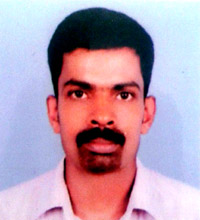You are here

Rajeesh Kumar is an Associate Fellow at the Institute, currently working on a project titled “Emerging Powers and the Future of Global Governance: India and International Institutions.” He has PhD in International Organization from Jawaharlal Nehru University, New Delhi. Prior to joining MP-IDSA in 2016, he taught at JamiaMilliaIslamia, New Delhi (2010-11& 2015-16) and University of Calicut, Kerala (2007-08). His areas of research interest are International Organizations, India and Multilateralism, Global Governance, and International Humanitarian Law. He is the co-editor of two books;Eurozone Crisis and the Future of Europe: Political Economy of Further Integration and Governance (London: Palgrave Macmillan, 2014); and Islam, Islamist Movements and Democracy in the Middle East: Challenges, Opportunities and Responses (Delhi: Global Vision Publishing, 2013).

Indian and Chinese Approaches to United Nations Peacekeeping in Africa
This monograph delves into Indian and Chinese approaches to UN peacekeeping in Africa, offering insights into how these rising powers interact with African nations. It analyzes their motivations and guiding principles in peacekeeping on the continent, comparing their approaches and highlighting differences in scope and impact.
Can the Security Council Help Bring Peace to Gaza?
Resolution 2728, adopted by the United Nations Security Council on 25 March 2024 carries political implications beyond its text, particularly due to the US decision to abstain.
MONUSCO's Early Withdrawal and the Future of UN Peacekeeping in Africa
The UN should shift towards more traditional and narrowly focused peacekeeping missions and maintain a clearer and more distinct role as a neutral mediator in conflicts.
BRICS: 15th Summit and Beyond
The 15th BRICS Summit showcased the organisation’s resilience, adaptability and collective vision, and positioned the group as a potent global player.
Multilateralism Matters: Adoption of the Treaty of the High Seas and its Significance
The adoption of the Treaty of the High Seas by the United Nations represents a significant triumph for multilateralism.
International Law Matters: Implications of the ICJ Reparations Judgment in the DRC v. Uganda Case
The ruling is considered the most detailed decision of the United Nations' top court in war compensation and signifies the occupying powers' reparation duties for damages resulting from its direct and indirect actions that violate international law. The judgement is undoubtedly historic and destined to act as a precedent for future cases. It once again establishes the fact that international law matters in situations of interstate armed conflicts.
Explained | Multilateral reforms as a priority in the G-20
Associate Fellow, Manohar Parrikar IDSA, Dr Rajeesh Kumar’s article ‘Explained | Multilateral reforms as a priority in the G-20’ has been published in ‘The Hindu’ on 06 March 2023.
The article analyses should multilateralism be given importance in today’s global order? How can the G-20 help in multilateral reform? Can multiple minilateral groupings become an alternative mode of multilateral cooperation? Why would global powers be averse to the idea of reform in multilateral institutions?
G20 and Inclusive Green Growth: Can India Take It Forward?
Associate Fellow, Manohar Parrikar IDSA, Dr Rajeesh Kumar’s article ‘G20 and Inclusive Green Growth: Can India Take It Forward?’ has been published in the India Foundation Journal, on 31 October 2022.
India’s G20 presidency comes at a critical stage in world affairs, where deep-rooted fault lines emerge, and transformative solutions are needed, says Dr Kumar.
Read Complete Article [+]
India in the United Nations Security Council
India’s voting pattern at the United Nations Security Council shows that it is proactive and positive towards the UNSC agenda.
Technology and Peacekeeping: Can India Become a Technology-Contributing Country
In August 2021, under India’s presidency, the United Nations Security Council (UNSC) adopted a statement recognising the importance of technology in peacekeeping. At the high-level Security Council open debate on ‘technology and peacekeeping’, India’s External Affairs Minister Dr S. Jaishankar stated that ‘21st-century peacekeeping must be anchored in a strong ecosystem of technology and innovation’.1 In the meeting, UN Secretary-General António Guterres outlined the elements of a digital transformation strategy for peacekeeping.